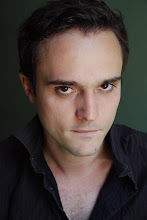Plot: Three astronauts run out of fuel and land on an asteroid which seems exactly like Earth - except none of the people are moving. They come to learn that this is an elaborate cemetery where wishes come true... eternally.

Hurray, another "three guys in a space ship" episode! I say it in jest, as I enjoy classic sci-fi elements, but these guys could be the crew from "And When the Sky Was Opened" or "I Shot an Arrow into the Air" and not much would change. "I Shot an Arrow into the Air" even had the crew landing on an Earth-like asteroid. What this episode does have over those is the tall, dark haired actor who seems to be imitating William Shatner's Captain Kirk, six years before Kirk graced our sets! He had so many lines that made me laugh unnecessarily. "This is a tractor. They used them in the 20th century, before... The Total War."

Ideologically it's a downbeat but thoughtful piece. Charles Beaumont penned this one and while it wasn't as intriguing as "Perchance to Dream," I still find myself identifying with his views, assuming that his work is a reflection of them. The asteroid-cemetery allows the deceased to be frozen in tableaux, like a wax figure, forever preserved while having their greatest wishes fulfilled. One man is perpetually being inaugurated as mayor. A frumpy woman wins a beauty contest. One simple man enjoys the serenity of a quiet life on a farm. In effect it's meaningless, as being deceased prevents the individual from feeling the joy of wish fulfillment, but really it's the only way it can work. As the caretaker puts it, "... while there are men, there can be no peace." As long as other people exist, there will be competition for status and interruptions from quiet. The only way to make everyone happy is to create a world devoid of human life. To put it another way, "you can't always get what you want."






















